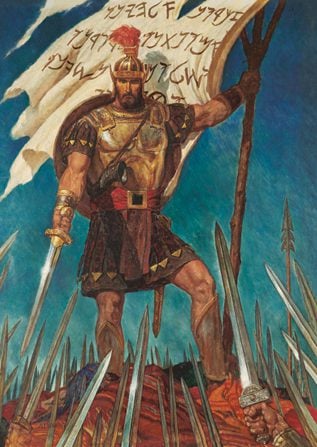
(LDS.org)
***
But, first, here’s a link to my latest article in Meridian Magazine:
“The Sacred History of the Church in Hawaii”
***
And now, on to today’s newly posted article in Interpreter: A Journal of Latter-day Saint Faith and Scholarship, written by Duane Boyce:
““Beloved by All the People”: A Fresh Look at Captain Moroni”
Abstract: In his well-known volume about the Book of Mormon, Grant Hardy focuses primarily on the book’s main narrators. However, he also makes a number of observations about other figures in the book that are of particular interest, including some about Captain Moroni. In addition to those I address elsewhere, these observations range from the assertion that Captain Moroni slaughtered his political opponents in one instance, to his claim that Moroni is not depicted as “particularly religious,” to his claim that Moroni had a “quick temper.” The question is: Are such observations supported in the text? Carefully examining this question both shows the answer to be “no” and allows a deeper look into Captain Moroni.
I confess that, while Captain Moroni has never seemed to me not “particularly religious,” I have long thought, myself, that he had a quick temper. In fact, I’ve seen it as evidence of his historical reality; he seems to me a real, three-dimensional, flesh-and-blood, complex human character, not a paper cut-out figure. I’ve used this as a minor argument in favor of the historical authenticity of the Book of Mormon — a hint, at least, if not really a solid argument. And making that point once got me into trouble: Many years ago, after I had taught a Gospel Doctrine lesson in a California ward about the chapters in Alma in which Moroni figures prominently, the bishop called me aside. A couple of older sisters had come to him with the complaint that, by pointing out a possible human flaw in one of the Book of Mormon’s great heroes, I was preaching “secular humanism.” Fortunately, the bishop wasn’t concerned in even the slightest degree. He chuckled, told me not to worry, and said that he had allayed their concerns.
I’ve long thought of Captain Moroni as an archetypal exemplar, curiously, of the “auxiliary” or warrior in Plato’s Republic, who is described by Plato as “spirited” (as well as an honorable lover of duty). Moroni’s “spiritedness” makes him an excellent fighter for his country and his people, but perhaps less than ideal as a philosopher-king. It is this “spiritedness” that gets him into trouble in his negotiations with Ammoron in Alma 54. and Alma 55 and in his correspondence with Pahoran in Alma 59, Alma 60, and Alma 61.
However, I’m willing to be persuaded otherwise.
Incidentally, I’m plainly on record (often, and as recently as last week) as an admirer of Grant Hardy’s Understanding the Book of Mormon.
Posted from Richmond, VIrginia












